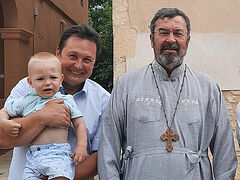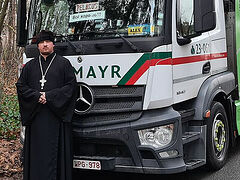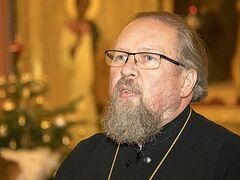He ended up in Austria while studying, unexpectedly became a priest, and today he is actively pastoring a Serbian parish in this country of the Alpine region. Archpriest-Stavrophor Sladjan Vasic has a Master of Theology degree and is a priest of the St. Nicholas Church in Mödling, Diocese of Austria and Switzerland of the Serbian Orthodox Church. We talked about the priest’s grandmother, the Christian values of the Austrians, hospitable Catholics, merciful parishioners, preaching as the main lesson in life, masterpieces of Viennese architecture and the fact that in Christ there is neither Greek nor Jew.
—How did you convert to the faith?
—My grandmother brought me to church, and she instilled love for the faith and the Church in me. This, incidentally, became the starting point for my future study of theology.
—Why did you decide to become a priest?
—It’s hard to explain... From the very beginning I felt a calling to serve the Lord. That’s all.
—But the main question is how did you end up in Austria?
—I came to Austria because I had received a scholarship to study German at a local university. Over time, I got married, became a priest and continued my ministry here in Austria, since I had already been living in the country.
—What were your first impressions of the country? Tell us what catches your eye (both then and today) in terms of the lifestyle and mentality of the locals.
—Good impressions! I didn’t experience any culture shock. Austria is a country with well-established Christian culture and traditions. The Austrian mentality can only be described positively, and the Austrians as very open and friendly people. They are always ready to help.
 —Do you like living here? Do you have the desire to be sent back to your homeland?
—Do you like living here? Do you have the desire to be sent back to your homeland?
—I’ll tell you that Austria is a wonderful place to live. But if it’s the will of God, I will go back to Serbia. At the moment I am needed here.
—Austria is traditionally considered to be a country of Western Christianity—Catholicism or Protestantism. Tell us about the history of Orthodoxy in this country.
—There is a long history of Orthodoxy in Austria. For example, according to the decree of Emperor Leopold, who ruled between 1657 and 1705, as early as 1690 Orthodox Christians were allowed to celebrate services without hindrance, which had never happened before.
—How many Serbian parishes are there in Austria today? And how many Orthodox Christians (and of which jurisdictions) are there at the moment?
—There are over twenty large Serbian communities in Austria today. Among the jurisdictions are the Russian, Constantinople, Serbian, Bulgarian and Romanian Churches.
—Is the community large today? Does it consist of Serbs or are there representatives of other ethnic groups, including locals?
—On Sundays about one hundred people of different nationalities come to us. Orthodox Austrians attend our services as well. Thank God, gradually we are getting more and more people.
—Do you celebrate services only in Serbian?
—No, mostly in German. But also in Church Slavonic, Greek, Romanian and Bulgarian. One way or another, we have “inserts” and even whole services in the languages of all the Local Churches represented in our area.
—Are there any patterns in the motives of your Serbian parishioners who moved to Austria from the “Serbian world”?
—There are always isolated cases when Serbs move from their homeland to Austria. It can be a family reunion or looking for a new job or just a new life. Of course, there are such cases.
—Tell us the most striking story you have of Austrians converting to Orthodoxy in your parish.
—I am always happy to see how the Church grows! And recently we had such a case: A young Catholic converted to Orthodoxy simply after attending our Divine Liturgy... Moreover, he made a confession of Orthodoxy after the end of the service in front of all the parishioners!
—Awesome! By the way, concerning your parishioners. Are they involved in the life of the community? Do the parish’s well-being and financial issues lie entirely on the priest’s shoulders, or do you have assistants?
—During the pandemic we held services in a small church. But due to the restrictions we were prohibited from doing this. And I had to celebrate services in a gym! Its size allowed us to observe the needed distance between the parishioners.
We prayed then that we would have the opportunity to celebrate the Liturgy in church again, as we used to. And imagine, a few months later we were provided with a large church! We moved there safely and now we celebrate services there. And it was not only my desire, but the desire of the whole community to obtain a larger church. We did it thanks to the mayor’s office. And our parishioners are very active. They take care of cleaning the church and preparing the meal after the Liturgy. We live exclusively on voluntary donations from our own parishioners. And our community is active not only on Sundays, but seven days a week. We try and provide charitable aid to those who have found themselves in difficult life situations—both one-time aid, as well as long-term projects.
—Of course, I cannot refrain from asking you about your relations with the Russian parishes and representatives of the Russian diaspora in Austria.
—As always, we have excellent relations with our Russian brothers. As you know, the Russian Church also has the beautiful St. Nicholas Cathedral in Vienna. And our Russian brothers quite often come to the Liturgy in our church.
—How are relations with the State developing? You mentioned help from the mayor’s office in obtaining a place of worship...
—We are grateful to the Austrian Government, and particularly to the municipalities of Traiskirchen and Mödling. They are always ready to help us. It was they who provided us with the opportunity to celebrate the Liturgy and helped to resolve the issue with the premises. I would like to note that the Catholic Church also supports us by providing its own properties for our services.Ssome of them were even given to us gratis.
—Do you work?
—Yes, I work in an Austrian school as a teacher of “the Orthodox Religion.” I have a master’s degree in theology, which gives me the right to teach.
—Do you think a priest should work?
—I believe that everyone should have the right to have a personal choice.
 —What serious spiritual questions from the parishioners do you as a pastor encounter in your ministry?
—What serious spiritual questions from the parishioners do you as a pastor encounter in your ministry?
—Everybody comes to the pastor with their own questions... They may be related to problems in family life and with children. As you know, in difficult times people always seek support in the Church, no matter what kind of problems they have.
—What do you regard as the challenge of the times for an Orthodox Christian? Perhaps specifically in Austria.
—The challenge in these difficult times is to remain a Christian. In this fast-flowing and turbulent time, the challenge is not to lose faith in God and His Church.
—What is the main lesson you have learned over the years of your priestly ministry?
—Over the years I realized that it is very important to always be ready to help someone, to be able to listen to him and support him spiritually. Preaching and finding the right approach to each person is very important—because people of different ethnic groups are coming to us to pray, with some Austrians among them.
—If an Orthodox pilgrim (or traveler) should come to Austria, what places would you definitely advise him to visit?
—First of all, I would advise him to visit the Mariazell Basilica (which houses a wooden image of the Theotokos, known as “the Great Mother Austria”, and is considered a national shrine); the Benedictine Melk Abbey; the Kübruck Chapel; and, of course, the beautiful churches of Vienna! These are St. Stephen’s Cathedral (Stephansdon) and the Karlskirche Baroque church.
—And our traditional question. What words from the Holy Scriptures especially inspire and support you in difficult moments of life?
—At this moment in my life, the following quote from the Epistle to the Galatians is closest to me: For ye are all the children of God by faith in Christ Jesus. For as many of you as have been baptized into Christ have put on Christ. There is neither Jew nor Greek, there is neither bond nor free, there is neither male nor female: for ye are all one in Christ Jesus. And if ye be Christ’s, then are ye Abraham’s seed, and heirs according to the promise (Gal. 3:26-29).
People of various nationalities pray in our parish, and we welcome every parishioner of any ethnic group.





